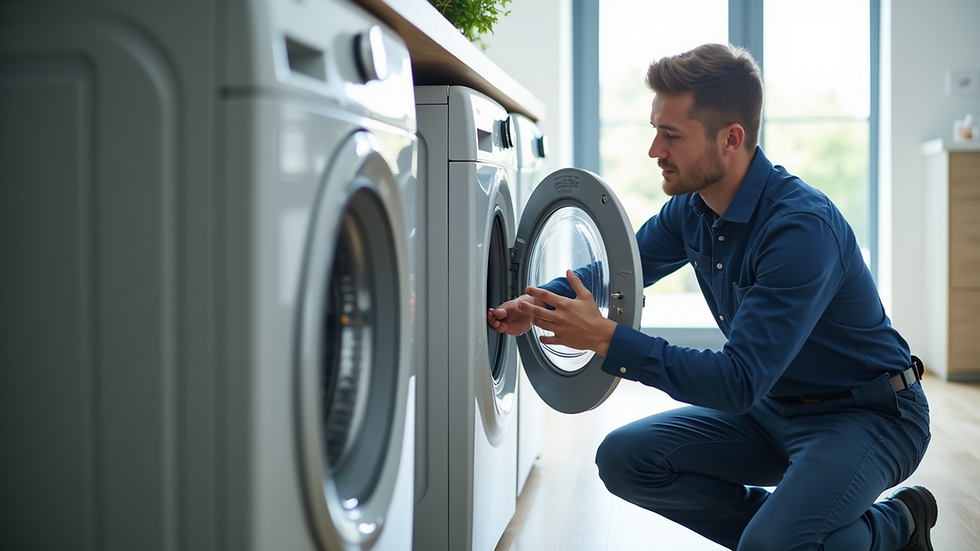DIY Appliance Repair Tips for Homeowners
- kumpuni2023
- 12 minutes ago
- 3 min read
When an appliance breaks down, it can throw your whole day off. I know how frustrating it is to deal with a fridge that won’t cool or a washing machine that won’t spin. But before you call a repair service, there are some simple things you can try yourself. With a little patience and the right guidance, many common appliance problems can be fixed at home. I’m here to share practical, easy-to-follow advice that will help you save time and money.
Understanding Common Appliance Issues
Appliances are complex machines, but many problems happen because of simple causes. Knowing what to look for can make a big difference. Here are some of the most frequent issues I’ve encountered:
Fridge not cooling: Often caused by dirty coils or a faulty thermostat.
Washing machine won’t drain: Usually a clogged pump or hose.
Oven not heating: Could be a broken heating element or a faulty igniter.
Dishwasher not cleaning well: Often due to blocked spray arms or filters.
Dryer not drying: Commonly caused by a clogged vent or a worn belt.
By identifying the problem early, you can decide if it’s something you can fix yourself or if you need professional help.

How to Safely Diagnose Appliance Problems
Before you start poking around inside your appliance, safety is key. Here’s how I approach diagnosing issues without risking injury or damage:
Unplug the appliance: Always disconnect power before opening panels or touching internal parts.
Check the manual: Your appliance’s user guide often has troubleshooting tips specific to your model.
Look for obvious signs: Burnt smells, leaks, or broken parts can give clues.
Use basic tools: A multimeter can help test electrical components if you’re comfortable using one.
Take notes: Write down what you observe and any error codes displayed.
If you’re unsure about any step, it’s better to pause and seek advice. Many appliance problems have simple fixes, but some require professional skills.
Quick Fixes for Everyday Appliance Problems
Let me share some easy fixes that have worked for me and many others. These solutions don’t need special tools or expertise:
Fridge coils cleaning: Dust and dirt on coils reduce cooling efficiency. Use a coil brush or vacuum to clean them every 6 months.
Unclog washing machine drain: Remove the drain hose and clear any blockages. Check the pump filter for debris.
Replace oven heating element: If your oven won’t heat, the element might be burnt out. It’s usually easy to swap out with a new one.
Clean dishwasher spray arms: Remove and rinse spray arms to clear food particles and mineral buildup.
Clear dryer vent: Lint buildup restricts airflow. Clean the vent pipe and lint trap regularly to improve drying.
These fixes can often restore your appliance’s function quickly. If the problem persists, it might be time to call in a pro.

When to Call a Professional for Appliance Repair
Sometimes, the problem is beyond a quick fix. Here are signs that you should contact a professional:
Electrical issues: If you smell burning or see sparks, stop immediately and get expert help.
Complex parts replacement: Some components require special tools or knowledge to replace safely.
Persistent leaks: Water damage can worsen quickly, so don’t delay repairs.
Repeated breakdowns: If the same problem keeps happening, a professional can diagnose underlying causes.
Warranty concerns: If your appliance is under warranty, unauthorized repairs might void it.
If you want to learn more about reliable appliance repair tips, visiting a trusted service provider’s website can be a great resource.
Tips to Prevent Appliance Problems Before They Start
The best way to avoid repair headaches is to keep your appliances in good shape. Here are some simple habits I follow:
Regular cleaning: Dust coils, clean filters, and wipe down seals.
Don’t overload: Avoid stuffing your washer or dishwasher beyond capacity.
Use appliances properly: Follow manufacturer instructions for settings and detergents.
Inspect hoses and cords: Replace any that show wear or damage.
Schedule maintenance: Some appliances benefit from annual professional checkups.
Taking these steps can extend the life of your appliances and keep them running smoothly.
Empower Yourself with DIY Appliance Repair
Fixing your own appliances can feel rewarding and save you money. Start small, stay safe, and don’t hesitate to ask for help when needed. With these DIY appliance repair tips, you’ll be better prepared to handle common issues and keep your home running efficiently. Remember, a little knowledge goes a long way!
If you ever feel stuck, professional repair services are just a call away to get your appliances back in top shape. Happy fixing!










Comments